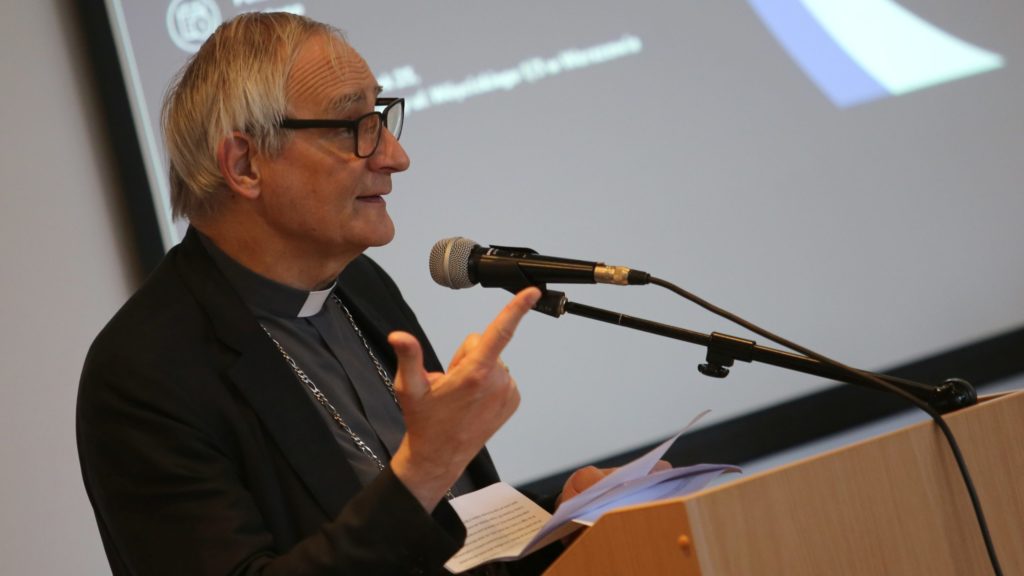A top Italian prelate and close papal aide has condemned the rise of antisemitism since the outbreak of the current war in Gaza, but has called for a ceasefire, saying Israel’s military offensive does not justify the rising civilian death count.
Speaking Feb. 18 on Italian television program In Mezz’ora shown on state broadcaster RAI, Italian Cardinal Matteo Zuppi lamented the many violent conflicts raging throughout the world, saying, “We must always try to see peace, war is always a terrible defeat.”
“Every day more is a day of anguish. Peace is something that requires a lot of experiments, many attempts, it must be sought with obstinacy, and we are convinced that it will come,” he said, saying the international community has a role to play, and “cannot keep itself out.”
In terms of the ongoing war in Gaza, Zuppi issued a “strong and clear condemnation” of antisemitism and of the Oct. 7, 2023 surprise attack by Hamas that left some 1,200 Israelis dead and over 200 more taken as hostages.
Zuppi called the Hamas attack “a terrible violence which killed innocents” and an “expression of something that we cannot accept.”
However, he also backed recent remarks from the Vatican’s Secretary of State, Cardinal Pietro Parolin, who acknowledged Israel’s right to self-defense, but said their military response to the Hamas attack has been disproportionate.
Israel’s embassy to the Holy See hit back against that statement, calling Parolin’s remarks “deplorable,” saying Hamas uses civilian infrastructure for terrorism and that since they started the fight, they are responsible for the casualties. The embassy also noted that previous regional conflicts have yielded a much higher civilian death toll, which they said is indicative of their efforts to avoid unnecessary casualties.
However, Zuppi defended Parolin’s position, saying Parolin simply repeated “what many governments are saying, he said ‘ceasefire,’ because this operation does not justify a huge number of victims.”
“We hope that this appeal will be accepted by Israel, and we will begin to look to the future,” he said.
Zuppi, who serves as the archbishop of Bologna and president of the powerful Italian Bishops’ Conference, is also Pope Francis’s personal peace envoy for the war in Ukraine, and last year traveled to Kyiv, Moscow, Washington D.C. and Beijing in that capacity.
His efforts in the Ukraine war have so far focused primarily on the humanitarian situation and on negotiating the return of Ukrainian children forcibly deported to Russia.
In his remarks on RAI, Zuppi said collaboration with both Russia and Ukraine on the humanitarian front continues, and that “the two nuncios, in Moscow and Kyiv, are always in contact and help the contact between the parties so that family reunifications can be started, they have already begun.”
Zuppi also spoke about issues of national interest, including rising poverty rates in Italy and consistent animus over the issue of migration.
“We have a situation that cannot fail to worry us, which we cannot fail to realize…there are millions of people who live below the poverty line,” and who rely on some form of aid, he said.
He noted that the Italian bishops and the government have “different assessments and concerns” on the migration issue, and said the Church “can and must be present” to all people involved.
“The only side the Church takes is that of the person,” he said, saying, “the important, continuous, and constructive dialogue with all governments and also with the current government continues.”
Referring to the recent collapse of a construction site in Florence that left five workers dead, Zuppi also called for more investment safer working conditions, saying, “safety costs money, but life has a value that cannot ever be calculated.”
Understandable anger over the incident “must become lucidity to avoid hypocrisy or rhetorical speeches of easy morality,” he said, saying, “One of the biggest problems are the controls…the reductions mean inventing everything to obtain the contract.”
Zuppi also weighed in on end-of-life issues as Italy continues its longstanding debate on euthanasia, a sensitive topic for the ageing nation, stressing the need to invest more in palliative care, rather than assisted suicide.
“A great respect” is needed when addressing end of life issues, he said. “When we talk about the right to life there is, for example, the right not to suffer. Palliative care allows us to combat suffering” by making the person comfortable and loved through long-term accompaniment.
In this regard, he said, “much more should be done on this, because not suffering would allow you to choose a little more.”
“If I know that I will not suffer and that I will be accompanied, I will be treated (and) that someone will prevent me from being overwhelmed by pain and will accompany me with sedation,” then the situation becomes more manageable, he said.
Noting that the Italian parliament is continually weighing various proposals and petitions, Zuppi said the Church “will accompany the work of Parliament with great respect.”

